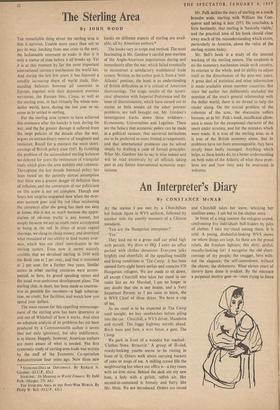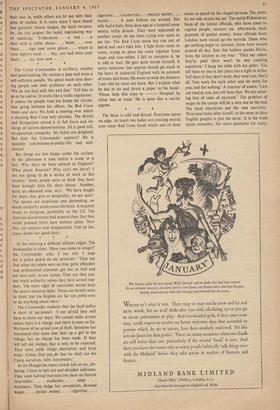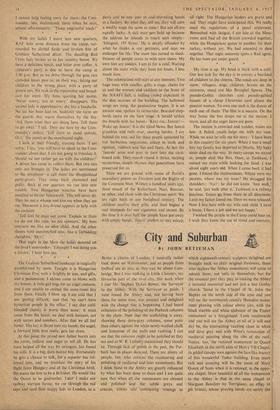An Interpreter's Diary
By CONSTANCE McNAB
AT the station I am met by a Churchillian but female figure in WVS uniform, followed by another with the courtly manners of a Chinese mandarin.
'You are the Hungarian interpreter?'
'Yes.'
They lead me to a green staff car piled high with parcels. We drive to HQ. I enter an office packed with clothes donations. Everyone talks brightly and cheerfully of the appalling muddle and living conditions in 'The Camp.' It has been opened forty-eight hours earlier and contains 970 Hungarian refugees. We are made to sit down, all except Churchill who takes her stand in our midst like an Air Marshal; I am no longer in any doubt that she is our brains, and a Very Important Person; as I am soon to learn, she is WVS Chief of three shires. We have a cup of tea.
As no meal is to be expected at The Camp until tonight, we buy sandwiches before piling into the car : Churchill, a WVS driver, Mandarin and myself. The foggy highway unrolls ahead. Birch trees and fern, a wire fence, a gate, The Camp.
We park in front of a wooden but marked : 'Clothes Store. RUHATAR.' A group of ill-clad, rowdy-looking youths seems to be rioting in front of it. Others walk about carrying buckets of coke or mugs of tea. A milling crowd fills the neighbouring but where our office is—a tiny room with an iron stove. Behind the desk sits my new boss, a lady with a girlish, raffish air. Her second-in-command is homely and furry like Mr. Mole. We are introduced. Orders are issued and Churchill takes her leave, whisking her satellites away. I am led to the clothes store.
In front of a long counter the refugees crowd, confronting five individuals half-hidden by piles of clothes. I take my I stand among them. It is cold. A young, disdainful-looking WVS shows me where things are kept. So these are the proud rebels, the freedom fighters; this dirty, pitiful, rascally-looking lot! I recognise the old short- comings of my people; the swagger, here with- out the elegance; the self-centredness, without the charm; the dishonesty. What eleven years of slavery have done is evident. By the entrance a perpetual Mutiny goes nn—men trying to force their way in, while others are let out with their piles of clothes. It is years since I have heard that guttural, Asiatic tongue, the thick vernacu- lar, the city jargon, the rapid, ingratiating way of speaking: 'Underpants . . . a vest . . . a shirt with a collar please . . . boots . . . over there . . . sign your name please . . . where is your registry card . . . hey, you had twice your share . . . my turn now. . .
The Camp Commander is ex-Navy, chubby and good-looking. He smokes a pipe and owns a self-sufficient poodle. We spend much time shov- ing people and their problems on each other. 'We do not deal with this and that.' Tell him to go to So and so.' It works like a traffic regulation : it makes the people mad but keeps the circula- tion going between his offices, the Red Cross room and ours. We hold a meeting over which a dazzling Red Cross lady presides. The British and Hungarians attend it in full force and the clergy of various denominations. All is good will, co-operation, sympathy. My ladies are delighted. But does the Commander approve? He is quaintly anti-women-in-public-life and anti- clerical.
But things are less happy under the surface. In the afternoon a man makes a scene in a hut. 'Why have we been enticed to England? What about America? Why can't we leave? I am not going to do a stroke of work in this country.' Some people seem to think they have been brought here for slave labour. Another, quite an educated man, says: 'We have fought for them, they give us hospitality, we are quits.' The glasses are suspicious and demanding, no doubt incited by anonymous elements. A majority Wants to emigrate, preferably to the US. The Austrian Government had assured them that they could proceed from here without delay. Now they are anxious and disappointed. Fed on lies, many doubt our good faith.
*
In the morning a deflated stillness reigns. The loudspeaker is silent. 'Have you come to resign?' the Commander asks. I say not. I urge for a police guard on the premises: 'They say that when the rebels were set free, petty offenders and professional criminals got out as well and are here now, in our camps. They say they can- not wield authority unless they have armed sup- port. The mere sight of constables would keep the restive elements quiet. These cut-throats seem to think that the English are far too polite ever to do anything about them.'' The Commander explains that the local police is short of personnel : 'I am afraid they will have to learn our ways. We cannot make arrests unless there is a charge, and there is none so far. We know of no actual case of theft. Someone has mentioned that some lads beat up a girl in the village, but no charge has been made. If they will sell old clothes, that is only to be expected. They must settle things themselves and' keep order. Unless they can do that we shall run the Camp ourselves, with interpreters.'
In the Hungarian room crowds fall on me, jab- bering. I have to sort out and decipher addresses. They want railway warrants (we have no forms), time-tables . . . medicines . . . soap . . . stationery. They lodge but complaints, demand wages . . . pocket money . . . cigarettes . . . cigarettes . . . CIGARETTES . . . POCKET MONEY ... WAGES. . . . A man follows me around. His wife had a baby three days ago at a hospital some twenty miles distant. They were separated at another camp; he has been trying ever since to see her. The Red Cross nurse has run out of petrol and can't take him. I fight from room to room, trying to piece his route together from maps and time-tables. I fail to complete it, he is told to wait. He gets quite beside himself. It seems ludicrous that anyone should get stuck in the heart of industrial England with its network of trains and buses. He wants to walk the distance. I am told he must not leave. But I explain what he has to do and thrust a paper in his hand: 'Please help this man to Hospital by either bus or train.' He is gone like a carrier pigeon.
The Mess is cold and dismal. Everyone seems on edge. At lunch two ladies are crossing swords over some Red Cross funds which one of them wants to spend on the chapel services. The padre by my side strains his ear. The stolid Pickwickian faces of the labour officials, who have come to register people, reassure me. Afterwards, back payment of pocket money. Some officials from London have mixed up the records. Those who get nothing begin to clamour. Some have waited around all day. Into this bedlam speaks Maria, from the kitchen at my rear : 'They say unless they're paid there won't be any cooking tomorrow.' I bang the table with my palm: `Go tell them no one in this place has a right to strike. Tell them if they don't work, they won't eat, that's all. You work for each other and we work for you, and for nothing.' A murmur of assent. 'I am not mad at you, just tell them that. We are await- ing lists of rates of payment.' The problem of wages in the camps will be a sore one to the end. The local electrician put the case succintly: 'Everyone looks after hisself, us the same as they, English peoples is just the same.' It is the trade union mentality. No more payments for today. I cannot help feeling sorry for them; the Com- mander, too, understands them when he says, almost affectionately: 'Those ungrateful toads!' * * With my ladies I move into new quarters, RAF huts sonic distance from the camp, sur- rounded by disrTial fields and broken bits of Graham Sutherland decor. The dazzling Red Cross lady invites us to her country house. We have a delicious lunch, and loiter over coffee. A children's party is due to leave the camp at 3.30 p.m. But as we drive through the gate two crowded buses pass us, on their way, taking our children to the wrong place, with a party of grown-ups. We rush to the transmitter and broad- cast for more. My boss, quoting her motto, 'Never worry, not to worry,' disappears. The second lady is apprehensive; she has a headache. No tea has been laid on. Suddenly she turns On the guards that warm themselves by the fire. 'Ask them what they arc doing here. Tell them to go away,' I ask. They are here by the Com- mander's orders. 'Tell them to stand outside. OUT.' She points at the snowbound night-.
I look at their friendly, trusting faces. am sorry,' I say, 'you will have to speak to the Com- mander about that. I am not going to translate it. Should we not rather get on with the children?' A driver has come to collect them. But tWo tots only are brought in, The ladies are summoned to the telephone--a call from the disappointed party-givers. They conic back chastened and guilty. Back at our quarters we run into new trouble. Two Hungarian wenches have been installed to do our housework. This will never do. They let out a whoop and kiss me when they sec me. Moreover a boy-friend appears to help with the curtains.
'Tell him he must not come. Explain to them we do not like men, we arc spinsters.' My boss instructs me like an idiot child. And the other shouts with outstretched ai•m, like 'a forbidding cherubim : 'Ow !"
That night in the Mess the ladies descend on the tired Commander : thought I was doing you a favour,' I hear him say.
The Graham Sutherland' landscape is magically transformed by snow. Tonight it is Hungarian Christmas Eve, with a brightly lit tree, and gifts, and a pantomime. I ,almost come to blows with my bosses. A little girl begs for an angel costume, and I tun unable to extract the store-room key from them. Finally I blow up. I am told that am 'getting difficult,' and that 'we can't have hysterical people in the office.' I say that cold- blooded charity is worse ' than none: it must come from the heart; we deal with humans, not with names and numbers. After that we all feel better, The key is thrust into my hands; the angel, a forward little brat really, gets her dress.
At this point the proud new father bursts into the room, radiant and eager to tell all. He has been helped all the way by strangers, has found ' his wife. It is a big; dark-haired boy. Fortunately he gets a chalice to talk, for a reporter has fol- lowed him, and we translate the story of his flight from Hungary and of the Christmas birth. He wants the boy to be a Britisher. He would like the Queen to be godmother. Later I make out railway warrant forms; we cut through thc, red tape and send four happy lads to London, to a party and to new jobs as coal-shovelling hands at a factory. By what they tell me, they will earn a weekly wage the same as mine! But not all are equally lucky. A sick man gets held up because the address he intends to reach saYS simply: 'Islington. 195 Street.' He is deeply offended by what he thinks is our pettiness, and says we endanger his life.- The snow has.tUrned to slush. 'Dozens of people come in with torn shoes. My Own feet are sodden. I am in for a cold. Waiting about the store while they hunt for boots, I lose much time.
The celebrations will start at any moment. Two huge trees with candles, gifts, a stage, chairs for us and the women and children to the front of the NAAFI hall, .a milling 'crowd.. expectant in the dim recesses of the building. The hallowed songs are sung, the pantomime begins. It is an ancient one, spoken in vernacular. Bearded shep- herds snore on the bare stage. A herald strikes the boards with his baton :• 'KELJ EEL, JANCSI!— Wake up, Jancsi,' It is the Glad News. But Jancsi grumbles and rolls over, snoring harder. J cry behind the tree, sad for these people uprooted by our barbarous migrations, asleep in sloth and egotism, violence and lies and fears. At last the `Jancsis' arise and peer in turn into the card- board crib. They march round it thrice, reciting mysterious, simple rhymes that generations have preserved for us.
Then we arc graced with • some of Peta's incendiary poems on Freedom and the Rights of the Common. Man. Written a hundred-years ago, these smack of the Kulturhaus, Nazi, Russian, or other, and clash with the Christmas spirit. We. are right back in our benighted century. The children receive their gifts, and then begins a real stampede for our cigarettes and sweets. By the time it is over hall the people have got away With empty hands, ..lawsi• prefers to stay asleep, all right. The Hungarian leaders are grave and sad. They might have anticipated this. We really need the regulations of a penal settlement, Benumbed with fatigue, I am late at the Mess- room and find all the British crowded together, while the Hungarians queue in another for their turkey,.. without joy. We had intended to dine together. That night someone spots a Red. agent, He has been put under guard.
My time is up. My head is thick with a cold. Our last task for the day is to convey a bus-load of children to.the cinema. The roads are deep in snow; villagers, dogs, children, horses on the common, stand out like Breughel figures, The pseudo-Gothic churches and pseudo-gabled houses of a cheap Christmas card please the peasant women. To own one such is the dream of each one of them. The film is a:success. On the way home the bus drops me at the station. I wave, and all the eager faces are gone.
The station is crowded and sodden, trains arc late. A Polish youth. helps .me with my case. While we wait he tells me his story : have been in this country for six years: When I was a 'small boy my family was deported to Siberia. My baby. sister died on the way. In many camps we stayed' at, people died like flies. Once, at Tashkent,' I missed my train while looking for food. I was about eight years old. When I came back it had gone. ',found the stationmaster. Where were my parents, where was my train? He shrugged his shoulders: Wier; he did not know. 'Just walk,' he said, 'just walk after it.' Fashkent is a railway junction. Trains go from there in. all directions. Later my father found me. Then we were released. Now I live here with My-wife and child. I have a home, 1 have a job and we arc happy.'
I wished the people in the Camp could hear us. 1 wish they knew the use of [hind and memory.
















































 Previous page
Previous page